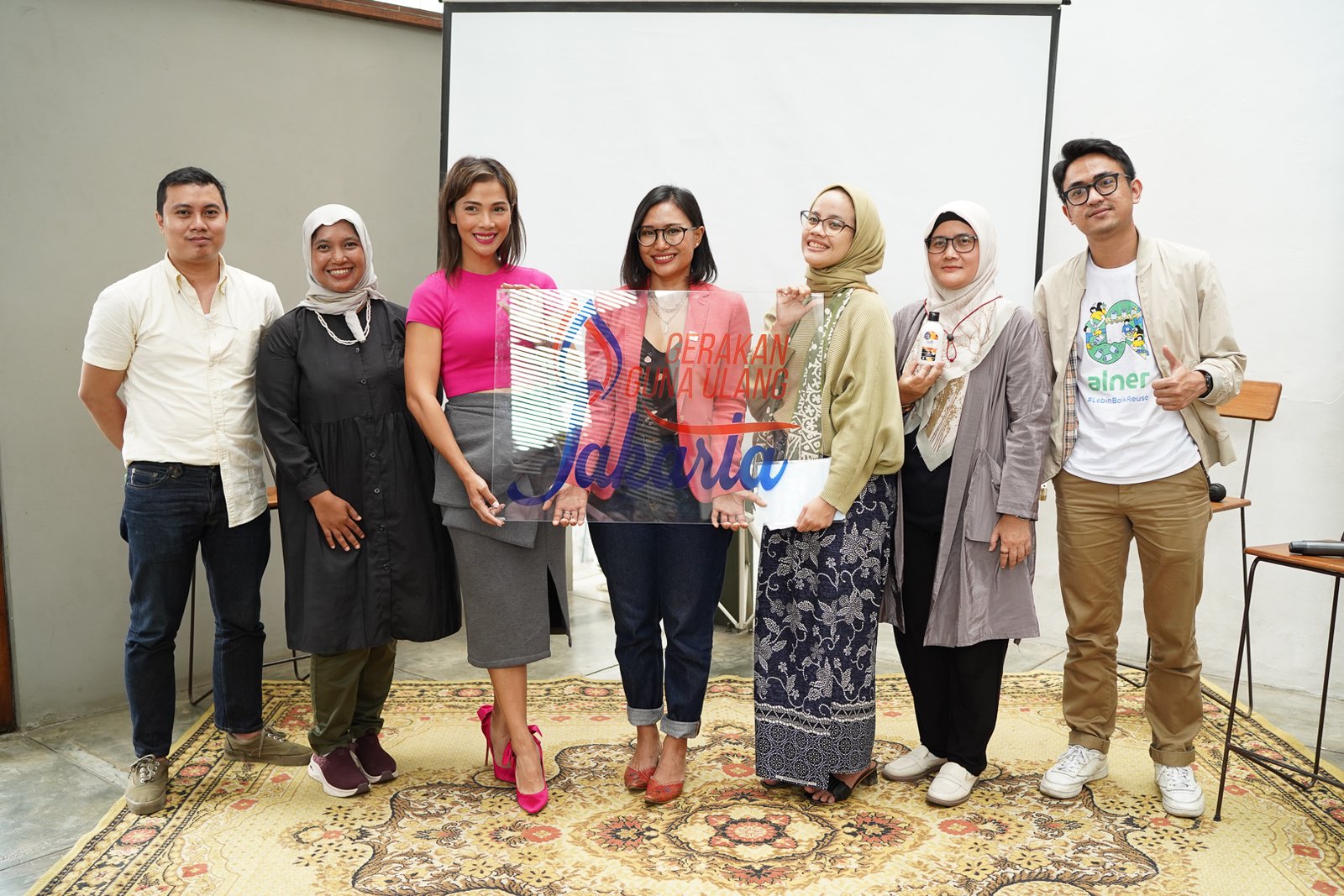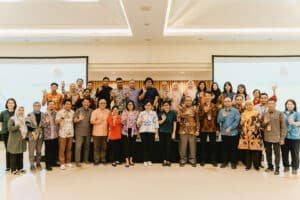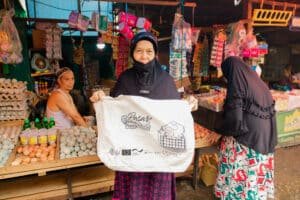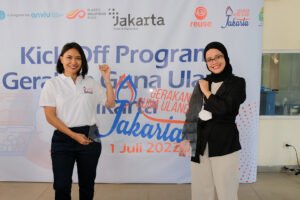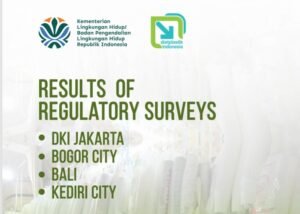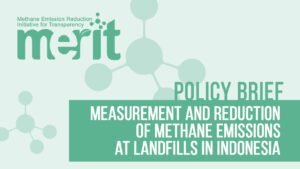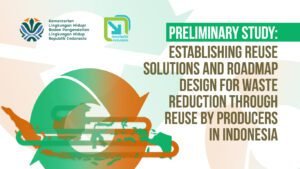Jakarta, 23 February 2023. Recently, photos of waste generation at the Bantar Gebang Integrated Waste Processing Site, which has reached 40 meters or the equivalent of a 16-story building, have been circulating. One effective and practical way to tackle the waste issue is by using plastic substitutes and adopting a reusable lifestyle.
Tiza Mafira, Executive Director of the Indonesian Plastic Bag Diet Movement (GIDKP), stated: “A reuse lifestyle is a lifestyle that adheres to the principle of use-use-return. Are you familiar with using gallons of water that must be returned after the water has been used? “The use-spend-return principle of using gallon water is then replicated in how we consume other household products so that the waste produced is minimal.”
“For the residents of DKI Jakarta, living a reuse lifestyle has become easier because of the Jakarta Reuse Movement (GGUJ) – an initiative to create an ecosystem that can support a reuse lifestyle in Jakarta. “Launched last year, Jakarta residents, especially the younger generation, are quite receptive to this reuse solution because it is convenient and affordable,” continued Tiza.
Many people feel that a reuse lifestyle is difficult, complicated, and expensive. Nadia Mulya, Public Figure & Ambassador of the Plastic Bag Diet, has succeeded in breaking this stigma and turning the lifestyle into a habit: “Now in Jakarta itself, there are many household product vendors as well as cafes and restaurants that support the reuse lifestyle. Many vendors sell daily household products, such as cooking oil, kitchen spices, detergents, and dish soap, in reusable packaging. “Usually, I buy the product through an online shop, and the packaging is picked up for free after the product is used up.”
Launched almost a year ago, this initiative was initiated by GIDKP and Enviu’s Zero Waste Living Lab (ZWLL) to reduce single-use plastic from everyday products, which is still a significant problem, such as food packaging, household product packaging, and plastic packaging from delivery services. Online food delivery. Involving three technology startups fostered by Enviu ZWLL, namely Alner, ALLAS, and QYOS, in developing solutions that support a reuse lifestyle, this initiative is in line with the “Jakarta Aware of Waste” program initiated by the DKI Jakarta Provincial Environmental Service to help the Central Government to reduce plastic waste in Indonesia.
“One of the keys so that the reuse lifestyle can be right on target is to involve brands that are close to the lifestyle of Jakarta residents because people are already familiar with the products. “Global FMCG companies Wipro and Unilever to local brands YAGI and Work Coffee are examples of companies and brands that have collaborated with our three startups in providing reusable packaging options to consumers in Jakarta,” said Darina Maulana, Indonesia Program Lead, Enviu, Zero Waste Living Lab.
Wipro, Unilever, and YAGI collaborate with Alner to provide a selection of home cleaning products, personal hygiene, and kitchen necessities with reusable packaging, sold at more than 100 points and on e-commerce platforms. These products are not contaminated but are original and directly obtained from official distributors, so they have the same quality as those sold on the market.
Work Coffee has partnered with ALLAS to use reusable food and drink containers for online orders. Once used, this reusable packaging can be returned or picked up for free by a Westbike Messenger Service courier to support further environmentally friendly initiatives at the core of the reusable lifestyle.
“Through GGUJ, Alner, ALLAS, and QYOS have helped the people of Jakarta implement the use-use-return principle by providing reusable packaging for household products, homecare food, and drinks. This shows that a reuse lifestyle can be a real choice. “GGUJ will be regularly monitored with the hope that its implementation can be more consistent and expanded to areas around Jakarta by embracing more producers, retailers, and the public as users,” said Darina.
“The reuse movement can result in lower emissions because it reduces plastic production from raw and recycled materials, and there is no waste at final disposal. Reused plastic emits at least 50% more greenhouse gases than a recycling scenario. “If standardization is carried out, reuse can reduce greenhouse gas emissions for consumer packaging by up to 80%,” concluded Tiza.
ZWLL Enviu’s Startup with Solutions to Help Reuse Lifestyles
***
About GIDKP
The Indonesian Plastic Bag Diet Movement (GIDKP) is a non-profit organization incorporated as an association that has received various awards for its efforts to realize a single-use plastic-free Indonesia. By taking an advocacy, collaboration, and education approach, GIDKP has succeeded in encouraging more than 70 cities/districts to ban single-use plastics.
GIDKP initiated the “Not Free Plastic Bags” (#Pay4Plastic) trial in 2016 throughout Indonesia with the Ministry of Environment and Forestry, which reduced plastic bag consumption by up to 55%.
GIDKP has received various awards, including the Mental Revolution Award from the Indonesian Government (2019) and the UN Ocean Hero 2018 appreciation from the UN. GIDKP’s activities were also covered in two documentary films, The Story of Plastic (2019), which won the Emmy Awards, and Pulau Plastik (2021).
About Zero Waste Living Lab
Zero Waste Living Lab (ZWLL) is a program from Enviu, a startup studio that develops solutions for environmental and social impacts. The business that ZWLL is building is specifically designed to make an exponential impact on reducing plastic waste upstream. Founded in 2019, ZWLL has launched seven firms that directly impact the environment and push the Indonesian market towards zero single-use plastic waste at the source.
For further information, please contact:
Renata Vania | GIDKP | ayo@dietkantongplastik.info | 0811 2441 901

